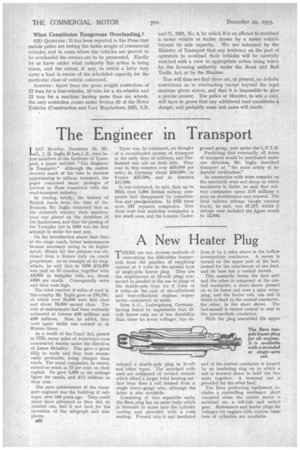The Engineer in Transport
Page 28

If you've noticed an error in this article please click here to report it so we can fix it.
LA.ST Monday, December IS, Mr. J—IL. J. M. Inglis.M.Inst.C.E..read,before members of the Institute of Transport, a paper entitled "The Engineer in Transport" Although the author devoted much of his time to matters appertaining to railway transport, the paper contained many passages of interest to those connected with the road-transport industry.
In tracing, briefly, the history of 'British roads from the time of the Romans, Mr. Inglis remarked that in the sixteenth century their maintenance was placed on the shoulders of the landowners, and that the passing of the Turnpike Act in 1663 was the first attempt to make the user pay.
On the introduction about that time of the stage coach, better maintenance became necessary owing to its higher speed. Money for this purpose was obtained from a licence duty on coach proprietors. As an example of its magnitude, he said that in 1830 £14,496 was paid on 33 coaches, together with £S.005 in turnpike tolls, i.e., about :C690 per coach. Consequently rates and fares were high.
The total number of miles of road in this country Mr. Inglis gave as 176,791,of which over 26,000 were first class and about 76,500 second class. The cost of maintenance had been variously estimated at betwen £40 millions and £60 millions. Now, he added, they were again under one control as in Roman times.
As a result of the Canal Act, passed in 1755, many miles of waterways were
constructed mainly under the direction of James Brindley. This gave a great
fillip to trade and they were enormously profitable, being cheaper than roads. The canal companies, he stated, earned so much as 75 per cent. on their capital. He gave 3,000 as the mileage figure for canals, and £13 millions as their cost.
The next achievement of the transport engineer was the building of rail ways, over 100 years ago. They could never have advanced as they did, he pointed out, had it not been for the invention of the telegraph and telephone.
B22
There was, he continued, no thought of a co-ordinated system of transport in the early days of railways, and Parliament was not on their side. They cost in this country over £50,000 per mile; in Germany about £20,000; in France Rzoo, and in America £11,000.
It was estimated, lie said, that, up to 1914, over 1,000 British railway companies had disappeared by consolidation and amalgamation. In 1875 there were 247 separate companies. Now there were four main-line companies, a few small ones, and the London Under
ground group, now under the L.P.T.B.
Predicting that eventually all forms of transport would be interlinked under one direction, Mr. Inglis described transport as " the main artery of industrial civilization."
In connection with some remarks on the inevitable wear and decay to which machinery is liable; he said that railway companies spent £18 millions a year on maintenance and renewal. The total railway mileage (single running track), he said, was 37,217, whilst if sidings were included the figure would be 52,900.












































































